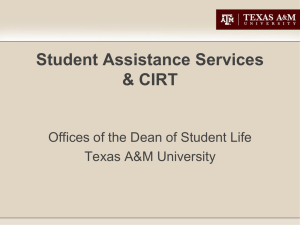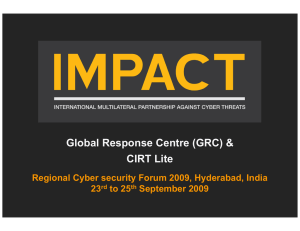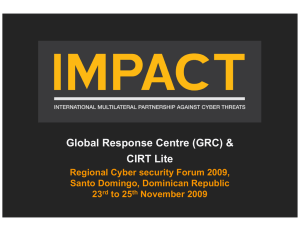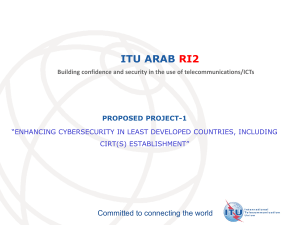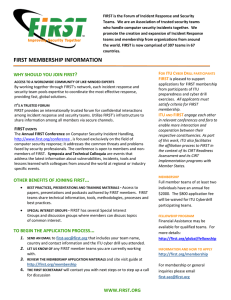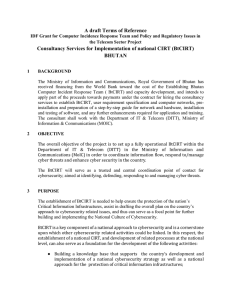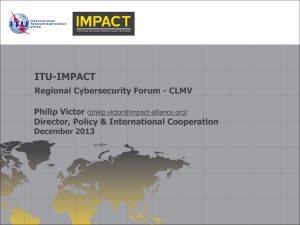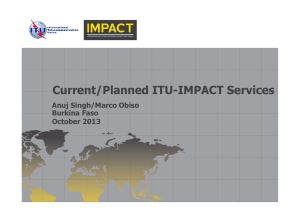CIRT/CERT Baseline Capabilities
advertisement
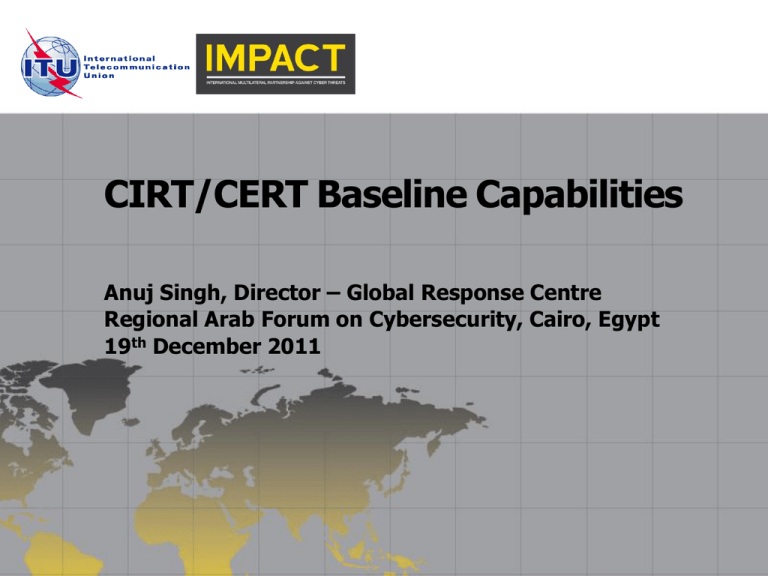
CIRT/CERT Baseline Capabilities Anuj Singh, Director – Global Response Centre Regional Arab Forum on Cybersecurity, Cairo, Egypt 19th December 2011 Agenda • • • • • • • Introduction Need for a National CIRT Benefits of a National CIRT CIRT Framework ITU-IMPACT Activities for member states Baseline Capabilities Cyber drill - ITU-IMPACT Alert 2 Introduction What is a CIRT Source: http://www.lakevalleyengineering.com/lve • A team that RESPONDS to cybersecurity incidents • Provides services to a defined constituency • Assist in effectively identifying threats, coordinate at national and regional levels, information dissemination • Act as a focal point for the constituency 3 The need for a National CIRT To ensure the continuity of society in times of crisis To protect essential services and critical national infrastructure To improve resistance to disruption To contain contagion effect To restore control in information dissemination To recover quickly back to original state of normalcy 4 Benefits of a National CIRT Serves as a trusted focal point of contact within and beyond the national borders Identifies and manages cyber threats that may have adverse effect on the country Helps to systematically respond to cybersecurity incidents and takes appropriate actions Helps the constituency to recover quickly and efficiently from security incidents Minimises loss or theft of information and disruption of services 5 Benefits of a National CIRT Better prepared against future incident handling based on lessons learned Deals effectively with legal issues Knowledge exchange platform among constituencies Develops and encourages adoption of security best practices & standards Promotes or undertakes the development of education, awareness and training materials 6 CIRT Framework National CIRTs drive and promote National Cybersecurity Strategies / Policies Cybersecurity Research International Cooperation Cyber Forensics Services Cybersecurity Awareness, Training & Education Security Assurance Governance / Legislations Critical Information Infrastructure Protection 7 CIRT Services Reactive Services Proactive Services SQM Services Alerts, Warnings and Advisories Announcements Risk Analysis Incident Handling Incident analysis Incident response on site Incident response support Incident response coordination Technology Watch Business Continuity and Disaster Recovery Planning Vulnerability Handling Vulnerability analysis Vulnerability response Vulnerability response coordination Artifact Handling Artifact analysis Artifact response Artifact response coordination Security-Related Information Dissemination Security Consulting Security Audits or Assessments Awareness Building Configuration and Maintenance of Security Tools, Applications, and Infrastructures Education/Training Product Evaluation or Certification Development of Security Tools Intrusion Detection Services Source: Handbook for CSIRTs – http://www.cert.org/archive/pdf/csirt-handbook.pdf 8 High-Level Process Creating a National CIRT Define the basic framework Establish the fundamental policies / procedures Train the staff Establish contact with other parties Announce the CIRT to the constituency Launch the incident handling system 9 Institutional & Organisational Requirements Mission Statement Physical Premise IT Infrastructure Stakeholders Human Resources Policies & Procedures Sponsor Services to Constituents Promotional & Branding Facilitators Constituents Awareness Campaigns 10 Workshops & CIRT Deployment - To help partner countries assess of their readiness to implement a National CIRT. - IMPACT reports on key issues and analysis, recommending a phased implementation plan for National CIRT. - Three countries are moving ahead with the deployment of the National CIRT with the help from ITU-IMPACT No. Partner Countries Assessment Status 1 Afghanistan Completed in October 2009 2 Uganda, Tanzania, Kenya & Zambia Completed in April 2010 3 Nigeria, Burkina Faso, Ghana & Ivory Coast Completed in May 2010 4 Maldives, Bhutan, Nepal & Bangladesh Completed in June 2010 5 Serbia, Montenegro, Bosnia, Albania Completed in November 2010 6 Cameroon, Chad, Gabon, Congo Completed in December 2010 7 Armenia and Laos Completed in November 2011 8 Cambodia, Myanmar and Vietnam Completed in November 2011 9 Senegal, Togo, Gambia and Niger Completed in November 2011 11 ITU-IMPACT Support for Member States Proposed CIRT Model ITU –IMPACT Support • 6 – 8 months • Reactive CIRT services Phase 1 Phase 2 • 9 – 18 months • Proactive CIRT services • 19 – 24 months • Security Quality Management services Phase 3 12 Baseline Capabilities • Defines a minimum set of CIRT capabilities that address the challenges and priorities for National CIRT Service Portfolio Mandate and Strategy Operation Cooperation 13 Mandate & Strategy Requirements and Recommendations • National CIRTs need a clear mandate to serve a well-defined constituency • Their role should be embedded in the strategy for national cybersecurity and established in an appropriate body with adequate funding. • Develop a strategic approach to cyber-security and CNI protection • The mandate for the national / governmental CIRT should clearly define the scale and scope of its activities 14 Service Portfolio Requirements and Recommendations • CIRT services should be clearly defined in line with its mandate and strategy • Reduce the vulnerability of its constituency’s critical networks to cyber attacks and support effective responses to such attacks when they do occur. • Effective incident handling capabilities • Provide services to reduce the vulnerability of networks to cyber–attacks • Provide services to support an effective response to cyber–attacks 15 Operation Requirements and Recommendations • Must be able to respond to • incidents developing across borders since cyber-security incidents happen on a global scale • • Must have a reputation and competence in order to have the credibility which • underpins its operational effectiveness. Ensure that CIRT is sufficiently staffed with the required technical competence Secure and resilient communication and information infrastructure Located within physically secure premises and staff should be appropriately screened 16 Co-operation Requirements and Recommendations • Effective cooperation • National CIRT should be between CIRTs at all levels enabled to invest time and is required resources in building cooperative relationships • Requires trust and mutual respect between the bodies • Establish a clear framework involved for cooperation with national law enforcement agencies • Effective in building and stakeholders relationships • All cooperative relationships should be supported by agreement 17 ITU-IMPACT ALERT (Applied Learning for Emergency Response Team) Introduction to ALERT (Applied Learning for Emergency Response Team) • Carried out on the 1st of December 2011 in Yangon, Myanmar • Focused exercise for four countries – Cambodia, Laos, Myanmar and Vietnam • Three scenarios were developed for the participants: • Analysing SPAM • Analysing defacement of a Website • Analysing Malware and taking control of the Command and Control Server • Supported by F-Secure and Trend Micro 19 Objective • Evaluate the readiness of National CIRT in handling incident response • Enhance the CIRT’s incident response capabilities • Strengthening the national and international cooperation between countries in ensuring continued collective effort against cyber threats. 20 Conducting the Drill START • Organiser sent the incident Player receive incident via email scenario to the participants in an email. • Participant performed their investigation/analysis on the incident and come out with the solution. • The participants submitted the Player perform incident analysis NO Observer assist the player Done YES Submit final advisory report to the organizer via email solution in an advisory back to the organiser via email. Organizer send an acknowledgment via email END 21 Drill Setup Mail Server • All formal communication between the organizer and participants went through this mail server IRC Server • Informal communication such as questions or tips regarding the drill to solve the scenario • Ad-hoc notifications from the organizer • Collaborate with other participating CIRT teams Linux Server • Linux server was made available to the participants to perform their analysis. 22 References http://www.enisa.europa.eu/act/cert/support/baseline-capabilities http://www.enisa.europa.eu/act/cert/support/files/baseline-capabilities-of-nationalgovernmental-certs-policy-recommendations http://www.enisa.europa.eu/act/cert/support/files/baseline-capabilities-for-nationalgovernmental-certs http://cert.org 23 Thank you www.facebook.com/impactalliance IMPACT Jalan IMPACT 63000 Cyberjaya Malaysia T +60 (3) 8313 2020 F +60 (3) 8319 2020 E contactus@impact-alliance.org impact-alliance.org © Copyright 2011 IMPACT. All Rights Reserved.
